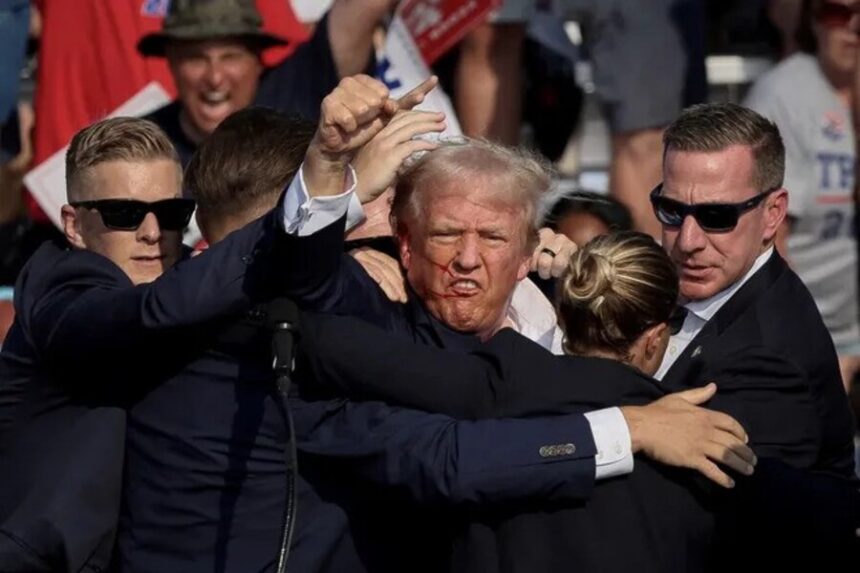One year after surviving an assassination attempt during a campaign rally in Butler, Pennsylvania, President Donald Trump’s second term continues to be shaped by that violent moment. The bullet that grazed his right ear and killed Corey Comperatore, a volunteer firefighter attending the event, has not only left a physical reminder but also transformed the tone, urgency, and symbolism of Trump’s leadership.
Trump regularly invokes the experience, describing it as a moment when he was “saved by God” to fulfill his mission to “make America great again.” From his inaugural speech to rallies and public remarks, this divine narrative has become central to his political identity. “I felt then, and believe even more so now, that my life was saved for a reason,” Trump declared at his swearing-in ceremony. Supporters and religious conservatives have echoed that sentiment, saying the event has given Trump’s presidency a spiritual mandate.
The Butler shooting came just after a faltering debate performance by then-President Joe Biden and dramatically reshaped the 2024 race. Sympathy surged around Trump, whose image — blood streaked across his face, pumping his fist — became an instant icon. He appeared at the Republican National Convention days later, bandage still on his ear, solidifying a sense of shared sacrifice among his base. Thousands wore imitation bandages in solidarity, and some likened his survival to a form of divine intervention.
Historians and political observers agree that the shooting altered both the campaign and the political landscape. “It was a dramatic turning point,” said historian Douglas Brinkley, who noted that Butler has become an indelible part of Trump’s political story — one that may eventually be featured prominently in his presidential library.
Trump has since moved quickly to assert his agenda. He ordered strikes on Iran’s nuclear infrastructure, initiated sweeping federal government changes, and launched mass deportation campaigns. Allies say this aggressive approach is driven by a renewed sense of urgency stemming from his near-death experience. “When you have one of these moments, you realize every day counts,” said former White House Press Secretary Sean Spicer.
The moment has also attracted new allies. Elon Musk, the world’s richest man, publicly endorsed Trump on the day of the shooting and later became the 2024 election’s largest donor, spending nearly $290 million to support Trump-aligned candidates. Musk even joined Trump onstage in Butler that fall, further intertwining political power, wealth, and Trump’s symbolism of resilience.
Inside the White House, the event is memorialized. A large painting on the State Floor shows Trump bloodied but defiant. A statue commemorating his fist pump now stands in the Oval Office. The messaging is clear: Trump not only survived, but he emerged as a chosen figure, ready to lead.
White House Press Secretary Karoline Leavitt emphasized the tragic loss of Comperatore in a statement marking the anniversary, saying Trump “will never forget Corey and his beautiful family.” She added, “On that dark day, God spared President Trump’s life by a miraculous millimeter. Now, one year later, President Trump is standing stronger than ever.”
Trump’s embrace of divine purpose has also intensified his connection with evangelical voters. Political rhetoric experts warn that the narrative of being “saved by God” is reminiscent of kings who ruled by divine right — a framing that, if accepted broadly, could justify far-reaching uses of presidential power. Texas A&M professor Jennifer Mercieca noted that Trump has leaned heavily into this idea since the shooting, using it as a rhetorical tool to expand executive authority.
As Trump continues to push legal boundaries and test the limits of executive power, supporters view him as a man on a mission, strengthened by survival. Critics, meanwhile, warn that the symbolism surrounding his survival is being used to erode democratic norms.
Regardless of perspective, the Butler shooting has become a cornerstone of Trump’s second presidency — not just a personal turning point, but a defining chapter in modern American history. For Trump, it serves as constant motivation. For his followers, it is proof of divine favor. And for the nation, it remains a moment that redefined politics, power, and purpose.




